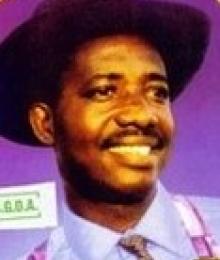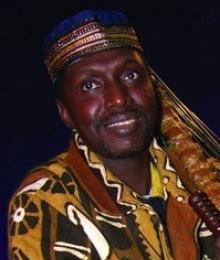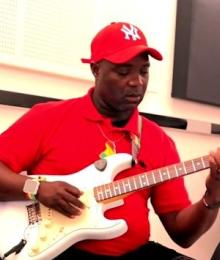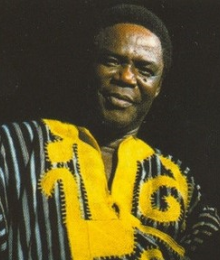
Cheick Penor Traoré, whose real name is Sékou Traoré, is a Guinean musician born in 1958 in Faranah, coming from a family of griots on his mother's side. An agricultural engineer by training with specialization acquired in Egypt, he has successfully balanced a career as a state civil servant - currently holding the position of Deputy Director General of the Office for Management of National Artistic Ensembles (OGEAN) - with a musical passion that led him from the federal orchestras of his youth to the Standard Group directed by Petit Condé in Conakry.
His discography includes a vinyl LP "Les messagers du Niger" (The Messengers of Niger) (1980) and two solo albums, "Kéléya" (1998) and "Londanya" (2008), whose title tracks draw their inspiration from the deep Sankaran region. A father of four daughters and passionate defender of Guinean musical heritage, he is concerned about the disappearance of national orchestras and works for the preservation of his country's musical traditions.
Introduction
Born in 1958 in Faranah, Cheick Penor Traoré is an essential figure in the Guinean musical landscape who has brilliantly combined a civil service career with his artistic passion. His remarkable journey, rooted in the musical traditions of Guinea, demonstrates a deep commitment to preserving his country's cultural heritage.
Origins and Education
His legal name is Sékou Traoré, son of the late Moussa and Maniamba Condé. Cheick Penor comes from a lineage of griots on his mother's side, his mother being "dyibamin Condé," which explains his early immersion in the musical universe. From a very young age, he was mentored by his uncle Blaky, a member of the Faranah federal orchestra, who introduced him to the art of singing.
His academic journey illustrates a balance between tradition and modernity. After completing all his primary and secondary education in Faranah, he pursued university studies at the Valery Giscard Destin Higher Institute of Agronomy in his hometown. He continued his specialization in Egypt, enabling him to return to Guinea as an Agricultural Engineer specialized in cotton cultivation. Later, he further enhanced his professional skills in Belgium, still in the agricultural field.
Musical Career with Deep Roots
Cheick Penor took his first steps in music in the early 1970s, initially with small school groups like Benda Band and City Band. In 1972-1973, he made a decisive move by joining the federal orchestra of Faranah as a singer, an ensemble that would profoundly shape his entire artistic career.
His musical journey evolved significantly with his assignment to Dubréka, where he served for nearly six years, practicing music occasionally due to the lack of skilled musicians in the region. He observed with concern the gradual disintegration of federal orchestras, mainly due to the shortage of musical instruments.
In 1990, his career took a new turn when he was assigned to Conakry. He then joined the Standard Group led by Ansoumane "Petit Condé," who would become his arranger and manager until his death on June 15, 2020. Simultaneously, he collaborated with several musical groups in the capital as a "Ninja" (freelance musician), thereby enriching his artistic experience.
Notable Discography and Unforgettable Memories
Cheick Penor's discography centers around three major works that have contributed to enriching Guinea's musical heritage. In 1980, he recorded a 33 RPM album with the prestigious Syliphone record label, titled "Les messagers du Niger" (The Messengers of the Niger). His first solo album, "Kéléya," was released in 1998, followed ten years later by "Londanya" (2008). These eponymous titles, which he himself describes as "fetishes," draw their inspiration from the depths of Sankaran and have left a lasting mark on the Guinean music scene.
Among his most memorable experiences, Cheick Penor recalls with emotion a festival where he performed with the Faranah federal orchestra. The song "Sakonkè" in their repertoire was so successful that it was encored three times at the request of the audience at the People's Palace, in the presence of President Ahmed Sékou Touré. On the other hand, his worst memory dates back to 2019, when a serious illness necessitated his medical evacuation to Dakar, thanks to the support of Madame Mariame SOGUIPAH, whom he affectionately calls "mother of the motherless."
Institutional Commitment and Vision for the Future
Today, Cheick Penor Traoré holds the position of Deputy Director General of the Office for the Management of National Artistic Ensembles (OGEAN), within the Ministry of Sports, Culture, and Historical Heritage. This position allows him to actively contribute to the preservation and promotion of Guinean culture, although his means of action remain limited.
A father of four daughters and a man of conviction, he takes a clear-eyed view of the current state of music in Guinea. His participation in the MASSA festival in Côte d'Ivoire made him aware of the glaring absence of Guinean national orchestras on the international stage, even though Guinea was once a pioneer in this field in West Africa. He laments the disappearance of orchestras in the country's interior and advocates for a musical revival through the provision of instruments to prefectures and better preparation for cultural events such as artistic fortnights.
Projects and Philosophy
Despite the difficulties, Cheick Penor is currently working on a new album with 12 tracks, for which he is actively seeking funding. His vision of music has been refined with age: "With age, music is wisdom. When the artist tends toward old age, that's when he should always think about giving good products for posterity," he confides. In parallel, he also plans to release a collective album with the Standard Group.
To make ends meet, Cheick Penor relies on his civil servant salary, supplemented by his royalties paid by the Guinean Copyright Office (BGDA) and the income from his performances with the Standard Group during evenings at Goundobaya and La Paillote. Far from mercenary considerations, he states that "the practice of music has brought me nothing but happiness since, in our time, money had no place. We invested ourselves in the development of culture."
Legacy and Influence
Through his exemplary journey, Cheick Penor Traoré embodies the resilience and richness of Guinean musical heritage. His attachment to his country's musical traditions, his clear vision of current challenges, and his constant commitment make him a respected figure on the national cultural scene. His close collaboration with Petit Condé, who died prematurely, also symbolizes the fragility of this heritage and the urgency of its preservation.
As a musician, agricultural engineer, civil servant, and visionary, Cheick Penor Traoré continues to proudly represent traditional Guinean music while calling for collective awareness about the importance of preserving the cultural roots that forge national identity. His message resonates as a call to action for future generations, guardians of an exceptional musical heritage of which he is one of the last great witnesses.






















